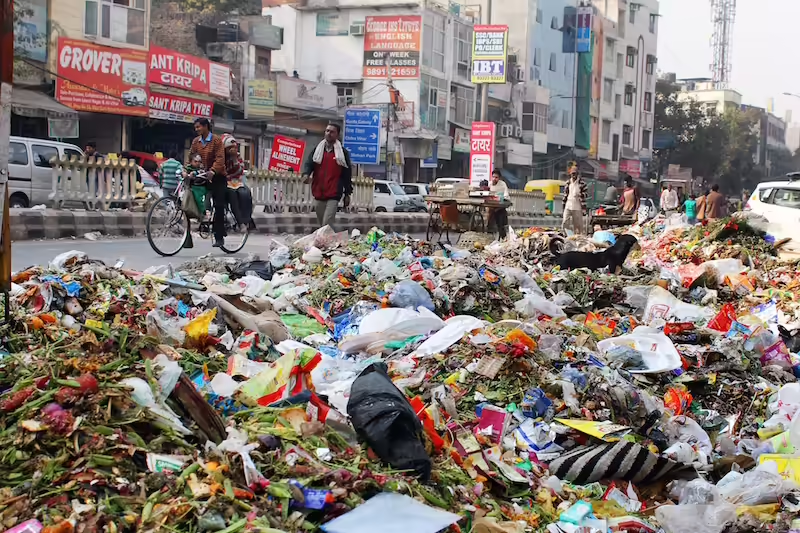
“Privatisation of sanitation services in India is not just about waste. It is about power, dignity, and who really runs our cities.”
When Mountains of Garbage Tower Over Cities, Can Privatisation Be the Answer?
India produces 1.5 lakh tonnes of waste every single day — enough to fill more than 15,000 trucks. Barely 30% of it is scientifically treated; the rest is dumped in mountains of trash that rise higher each year. In Delhi, the Ghazipur landfill now looms taller than the Qutub Minar, leaking poison into the ground and air. At the same time, over 300 people have died cleaning sewers since 2013, despite a legal ban on manual scavenging.
This is the messy backdrop against which municipalities are increasingly asking a difficult question: Should privatisation of sanitation services be left in the hands of private players?
Outsourcing Privatisation of Sanitation Services: From Quiet Contracts to a Full-Blown Urban Reality
Privatisation of sanitation services is not a distant plan — it is already reshaping Indian cities. Over 40% of Class-I cities outsource some sanitation services. Indore’s clean-city success is rooted in strict public–private partnerships. Nashik has outsourced 1,175 workers on a ₹237 crore contract. Delhi’s biomedical waste is now handled by private plants.
But the picture is not rosy everywhere. Ludhiana’s ₹33.8 crore tender for street cleaning got zero serious bidders, and Chennai has witnessed angry strikes, with sanitation workers warning their wages could drop by ₹8,000 a month if privatisation expands. The story so far is one of patchwork success, angry protests, and a deep question about fairness.
Why Supporters Believe Private Companies Are the Only Way Out of India’s Garbage Crisis
Municipal officials and reformers argue that the numbers speak for themselves. India has over 4,000 Urban Local Bodies, most of which are cash-strapped and unable to buy mechanised sweepers, GPS-enabled trucks, or hire enough staff. Private companies can step in with technology, innovation, and efficiency. Studies estimate 15–20% cost savings under well-monitored contracts.
Globally, examples are striking. Singapore reuses or recycles 95% of its waste under private contracts. Seoul enforces strict segregation and relies on private collection firms, reaching 90% recycling rates. For advocates, the message is simple: without private participation, India risks being buried under its own garbage.
Why Critics Warn Privatisation Could Turn a Public Service Into a Profitable but Unjust Business
Worker unions, activists, and critics argue that sanitation is not just a service — it is a lifeline tied to health, dignity, and survival. Ninety percent of sanitation workers belong to Scheduled Castes, and privatisation often means job insecurity, lower wages, and unsafe working conditions. Since 2013, sewer deaths continue despite laws meant to stop them. For critics, outsourcing is not efficiency — it is exploitation in a new form.
Financial warnings are also loud. Mumbai’s waste management costs jumped from ₹2,800 crore in 2017 to ₹4,000 crore in 2023 after privatisation. When contracts fail or companies underperform, it is citizens who suffer as accountability gets lost in red tape.
The Debate in India: A Tug-of-War Between Pragmatism, Politics, and People’s Lives
The Indian debate is not abstract. In Chennai, sanitation workers clashed with police after a 13-day strike against privatisation. In Ludhiana, garbage collectors threatened a statewide protest. Courts like the Madras High Court have made it clear: governments have the right to privatise, and courts will not interfere.
Meanwhile, the Centre pushes ahead with programs like Swachh Shehar Jodi, mentoring 200 cities on modern sanitation practices — many through outsourced models. India is not asking if privatisation will spread; it is asking how fast, how fairly, and at what cost.
Beyond the Streets: How Privatisation Could Decide the Fate of India’s Land, Water, and Air
Privatisation of sanitation services is not just about sweeping roads. It is environmental survival. India has 3,159 dumpsites covering 1.6 lakh acres — an area larger than the city of Bengaluru. Recycling rates remain stuck at 30%. If private players push composting, biomethanation, and waste-to-energy, the transformation could be radical. But if they simply move garbage from one heap to another, privatisation will be nothing more than a cosmetic fix.
Is the Hybrid Model the Only Realistic Way Forward for India’s Cities?
Most urban experts argue that a middle path is the only option. Municipalities must keep control of oversight, worker protections, and sensitive services, while private firms handle operations and bring in efficiency. Indore is the shining example — strict monitoring, citizen involvement, and clear contracts turned it into India’s cleanest city for several years in a row.
The lesson: Privatisation of sanitation services without accountability fails, but accountability without efficiency also fails. The two must work together.
The Real Question India Must Answer
Privatisation of sanitation services will not magically fix India’s sanitation. But municipalities cannot carry the burden alone either. The real question is not whether India should privatise sanitation, but under what terms.
Will contracts protect workers, or push them deeper into insecurity? Will private firms be held accountable, or will citizens be left helpless? Will privatisation mean clean, sustainable cities — or just expensive contracts and neglected slums?
Sanitation in India is no longer about brooms and bins. It is about dignity, survival, and the kind of cities India wants to build: efficient but unequal, or clean, fair, and accountable to all.
FOR MORE BLOGS – beyondthepunchlines.com

 Add to favorites
Add to favorites








